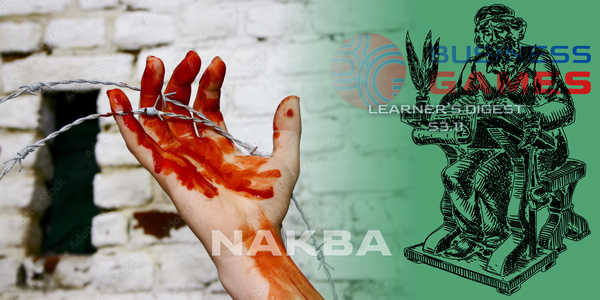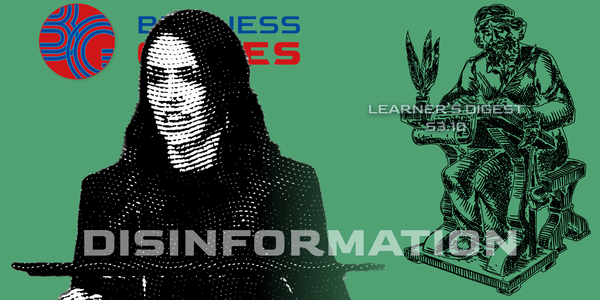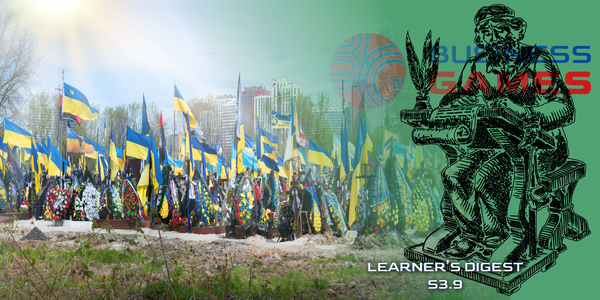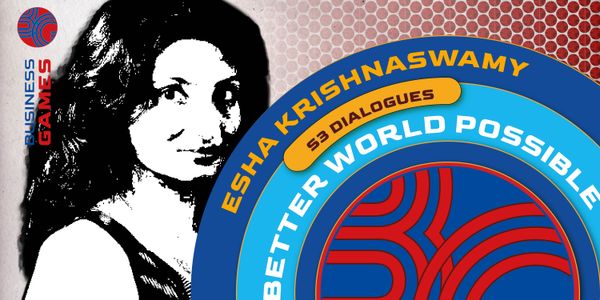Goebbels, Brand Management, and Genocidal Myth Making
Why did "Holodomor" myth took a real Soviet tragedy and turn it into a fake genocide? What does Goebbels have to do with brand management and the West's (anti-)marketing campaign of "Russia bad"?
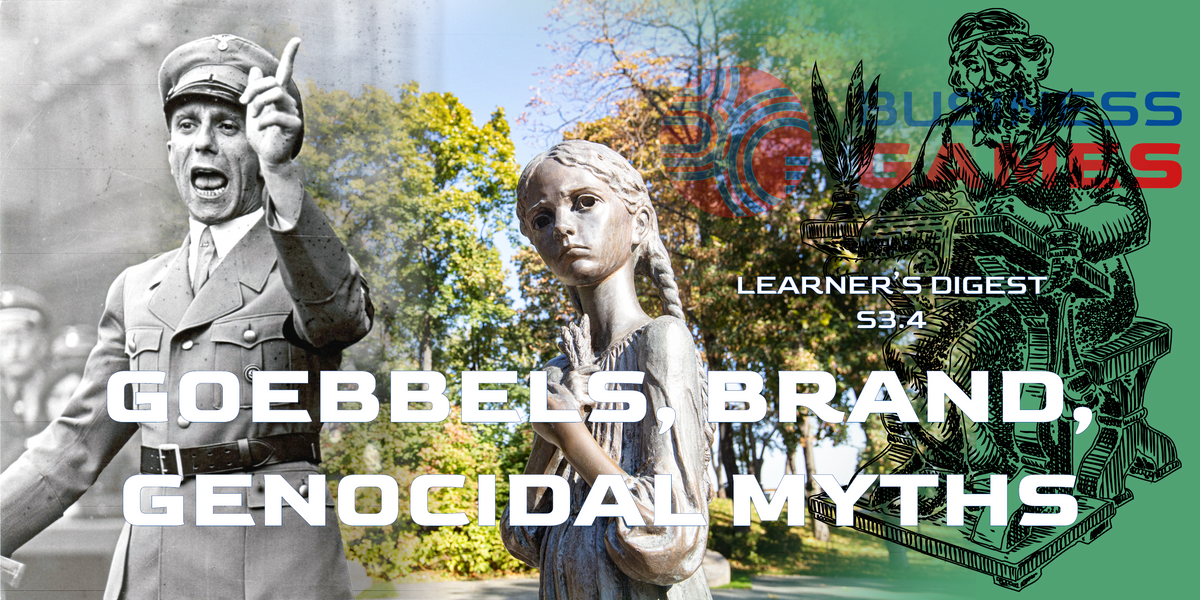
Intro
Welcome to!
The sixth entry in our Geopolitically Propagandistic Season, where I continue the discussion of the propaganda, how dehumanization branding works, and what makes it so pernicious.
I started this in my previous post and I'd like to explore the propaganda topic over the next few posts, before we get to the actors and the geopolitics of it all.
I highly encourage you to forward, share on social and in real life, take snippets, discuss…
…and of course support us with a paid subscription of your choosing: either normal or recession-proof price, both give you the same benefits and you pay what you want / can afford. Your choice.
In the previous 5 entries:
-
2022 and 11/12-ths tells a more personal side of my history as a former mid-core Ukrainian nationalist.
-
NY Times: Disinformation Central? Or: How I Lost Trust in the Western Mainstream Media and What to Do About It is what it says on the box: you cannot trust the Western mainstream media because they provably lie, but you can do something about it.
-
Dirty Dozen Thinking Principles: How I Process Information expands on the principles I use to critically evaluate the information flow—useful especially when you don't have time to validate all the evidence.
-
Mariupol & Bucha: Narrative v Reality is where I apply my "dirty dozen" principles to the Western mainstream narrative on Mariupol and Bucha. This is a blog entry, some of it is summarized in audio in the following newsletter + pod entry.
-
False Flags, False Narratives is about a censored peer-reviewed academic study by the foremost authority on the Ukraine's far-right from the University of Ottowa and why it's relevant to Bucha.
In my last post, I mentioned the writings of the Western academics and journalists who discuss Russophobia as racism, and Russophobia's (and Russiagate) impact on the West itself.
I'll now do 2 things:
-
Develop the topic of dehumanizing the Russians further,—and
-
Keep on applying our "dirty dozen" to the topic of the alleged Russian genocides.
I intend to continue discussing the Rossophobic propaganda (effectively, as a negative branding campaign by the West over several generations), the Ukrainian genocidal nationalism, and how the two come together in the Western proxy war on Russia.
Then, we'll cover the real background: "it's the economy, stupid." It is always the economy.
And once we've understood the real motivations of the actors and the means by which the public opinion and consent get manufactured, we'll cover the various actor factions, their moves, their revealed preferences, etc. in a more-or-less "formal" game-theoretic context.
By the end, you'll know more than you ever wanted about Ukraine, and an angle at the geopolitical interactions you're not going to get in the mainstream media. Some alternative sources cover some of it, so I'm going to do it purposefully different, so as not to repeat what's out there in exactly the same way.
After this post, I'm also removing my self-imposed handicap on using "good" Western and Ukrainian sources only.
Since my first posts of this season, I've by now shown beyond any reasonable doubt that the "credible" Western sources are often garbage—anything but credible—participating in the same mis- and disinformation campaigns that they accuse others of attempting. Happy to debate this point on merits; I've made my case in the NY Times and Mariupol posts, will gladly debate the facts and the logic with anyone who asks, in an open forum, in good faith.
But for now, time to use my own Principle # 12 and expand the sources:
- There is no single reliable source: everyone lies and misinforms.
Maybe, to a degree.
Maybe, on different topics.
Maybe, unwittingly.
Corollary: don't hunt for a single source, a piece of evidence or even a single type of evidence—instead look at the cumulative impact of all types, from all sources.
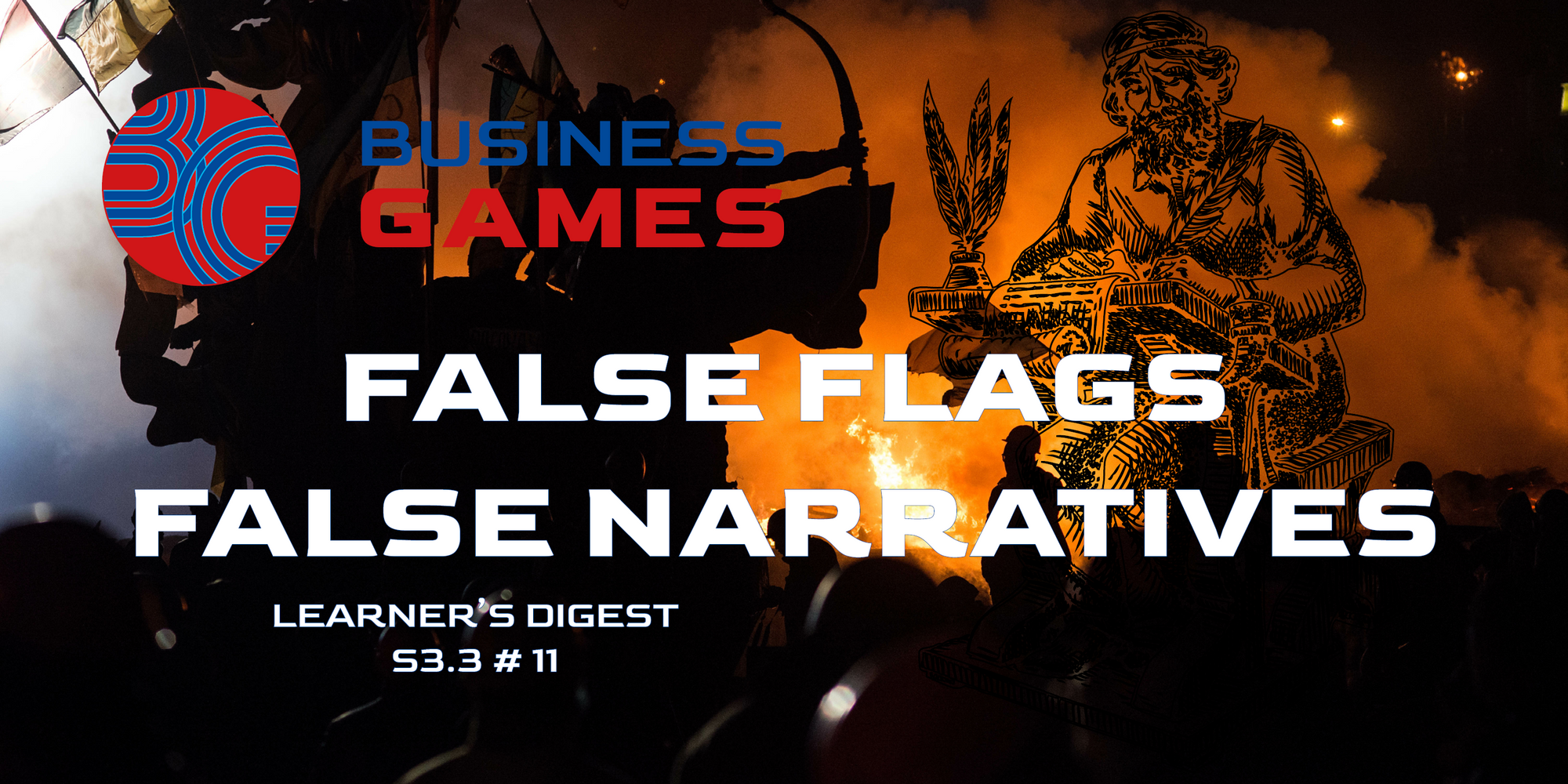
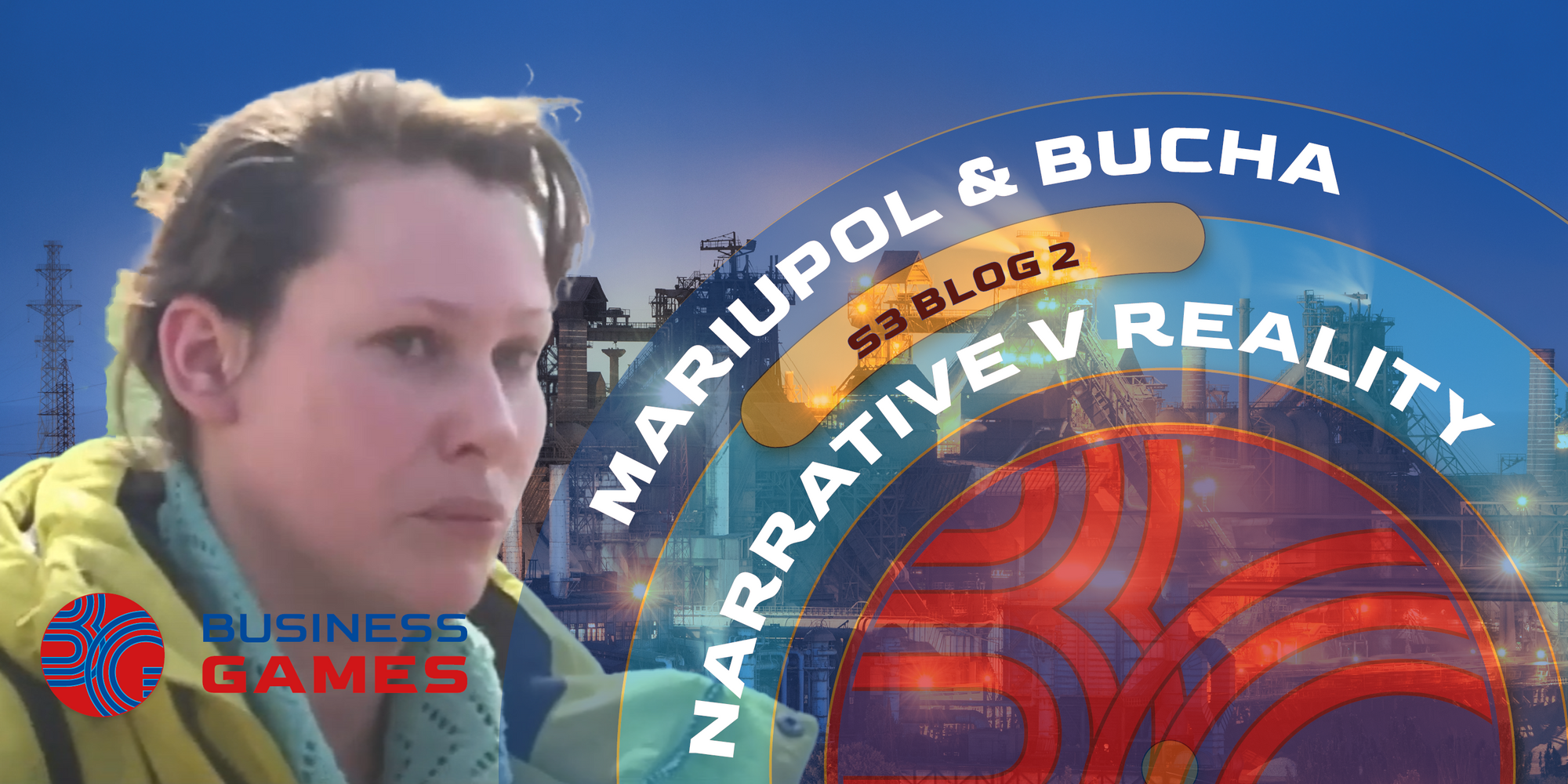
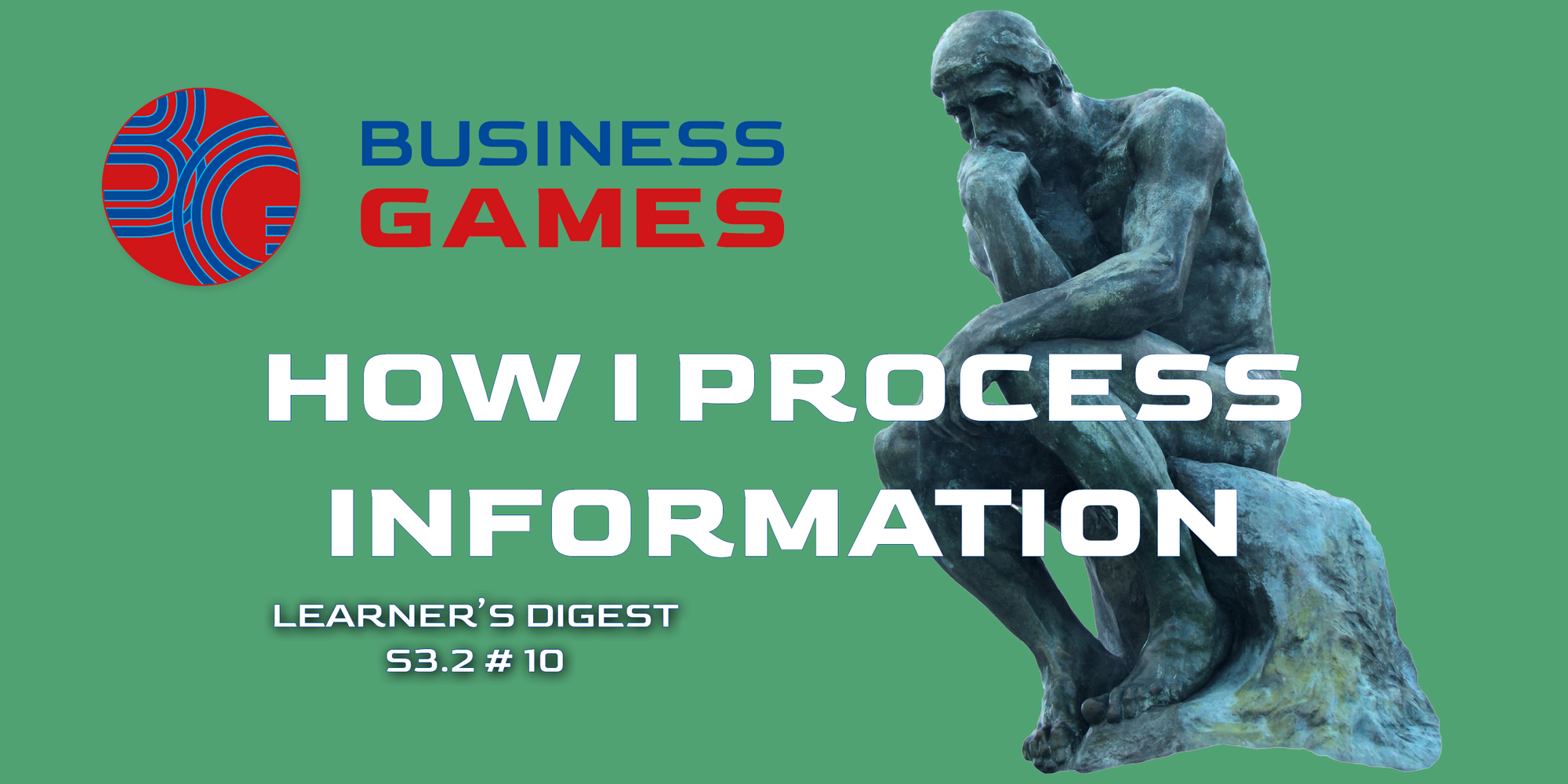
Content
Genocide as a Weapon of Propaganda [00:00]
It's fair to say—especially online or increasingly on TV in the West—that any political opponent in the modern discourse is immediately a "Nazi".[1]
Similarly, any historical grievance is a "genocide" that is thrown at any nation with a history of wars. That is, at any sizeable modern state.
The problem is obvious and three-fold:
-
Politically, the elites in a less wealthy and/or numerous nation want to use the victimhood status to gain potential reparations from the wealthier/more numerous nation, by any means possible—all's fair in love and war;
-
The impacts on the (wrongfully) accused are also clear: accusing various historical governments of (alleged) genocides smears their modern successors as well as the whole nations, thus dehumanizing them in a way;
-
And in turn, overusing such terms as "Nazi" and "genocide" cheapens these and diminishes the crimes of the actual Nazis, creates possibilities for denial of actual genocides such as the Holocaust or the Armenian Genocide, and whitewashes the Nazi revival such as various neo-Nazi movements.
I can think of no example more insane than the whitewashing of the Ukrainian Nazi collaborators Bandera and Shukhevich, their organizations OUN and UPA, and their modern Ukrainian equivalents such as Azov, S14, and the Right Sector—and at the same time bringing out all the decades of smear campaigns against the USSR and Russia, accusing them of multiple genocides.
Russophobia deserves its own post, and so do the Ukrainian Nazis both historical and modern. For now, I'll just look at genocide accusations against the historical and modern Russias.
Modern Days: 2022+ "Genocide" of Ukrainians [09:42]
If you've been on social media post-February 2022 or watched Ukrainian or Western mainstream TV, you no doubt came across the hysteria about Russia's "genocide" of Ukrainians—never with any proof, but always with emotions and sometimes with photoshopped pictures of Putin with blood and whatnot. I put "genocide" in quotes because it's pure BS—both on its own merits as well as in light of what the Kyiv regime had been doing in Donbass for 8 years.
But the fact of this being pure BS does not prohibit pro-Kyiv social and legacy media from using this rather crude lie for its own propagandistic purposes. Anytime a Kyiv regime air-defence rocket hits a Ukrainian civilian target (see below) or a Polish farm[2], there's immediately a "blame Putin" campaign coupled with "Russia's genocide" hysteria.
I don't plan on disproving a purely BS claim, because using Hitchens's Razor, "what can be asserted without evidence can also be dismissed without evidence."
Disproving BS is furthermore an unthankful job as per Brandolini's Law, a.k.a the bullshit asymmetry principle: "The amount of energy needed to refute bullshit is an order of magnitude bigger than that needed to produce it."
I will, however, show some examples.
Here is an example after a recent (15 January, 2023) tragedy in Dnipro:
Sickening watching Russia’s terrorist attacks on innocent civilians. They are baby killers and must be stopped. Arm Ukraine with everything they need to defeat Russia. Enough of allowing Russia to drag out its genocide campaign pic.twitter.com/GyD43rTeUY
— Olga Lautman 🇺🇦 (@OlgaNYC1211) January 17, 2023
Of course, Russia did not target civilians in Dnipro (or anywhere else, for that matter, but here I'm talking about the civilians in Dnipro, specifically)—we know this from Zelensky's top advisor at the time. Oleksiy Arestovych said that the Ukrainian air-defence shot down the Russian rocket above a residential block, such that the rocket went off course, hit the residential block, and detonated. He faced a backlash for speaking the truth and was later fired—but this doesn't change the fact that he spoke the truth.
Dnipro tragedy (as usual) is caused directly by 🇺🇦 air defence shooting 🇷🇺 rocket off its (legitimately military) course over the residential area, so that it falls into an apartment block, where it detonated. (Source: Arestovych, senior official advisor to Zelensky).
— 🅱🆄🆂🅸🅽🅴🆂🆂 🅶🅰🅼🅴🆂 🅿🅾🅳🅲🅰🆂🆃—🅰🅸 (@BusinessGamesAI) January 14, 2023
1/3 https://t.co/wSgIdTynQW
…and I think it's quite clear why: as I presented in Mariupol & Bucha: Narrative v Reality and False Flags, False Narratives, the Kyiv regime has a track record of false flag operations as well as spinning its own mistakes as "Russia's atrocities",—
Multiple Kyiv regime soldiers reported the same in the past, e.g. when they shot down a drone that fell into an apartment block in Kiev & killed civilians there.
— 🅱🆄🆂🅸🅽🅴🆂🆂 🅶🅰🅼🅴🆂 🅿🅾🅳🅲🅰🆂🆃—🅰🅸 (@BusinessGamesAI) January 14, 2023
Kyiv calculus is simple: it’s OK to spend own civilian lives for gruesome PR pictures of…2/3https://t.co/2b2SWcU7ld
…the benefit calculus for the Kyiv regime (dating back to the far-right Maidan days in 2014) is simple: the Western mainstream media will pick this up and multiply as "Russia's aggression", no matter the source of misery,—
…the so-called “Russian aggression”. The more civilian casualties, the better the picture. Stationing air defence inside residential areas & shooting down RF rockets above maximises the damage & PR value. Western mainstream & social media amplifies.
— 🅱🆄🆂🅸🅽🅴🆂🆂 🅶🅰🅼🅴🆂 🅿🅾🅳🅲🅰🆂🆃—🅰🅸 (@BusinessGamesAI) January 14, 2023
3/3#Dnipro #Ukraina
…but don't take my words for who the culprit is. Here are two past admissions—one by a Kyiv soldier and another by a major Ukrainian media outlet—about the civilian houses being destroyed by either the Russian drones that the pro-Kyiv soldiers willingly shoot off their course (knowing that they'll fall into residential areas), and by hitting the Russian rocket off course above the residential housing by the Kyiv air-defence missiles (just like in Dnipro):
4/3 More evidence from the past: in October 2022, similar incident with a drone & an apartment building in Kiev.https://t.co/ygWF0ssIri
— 🅱🆄🆂🅸🅽🅴🆂🆂 🅶🅰🅼🅴🆂 🅿🅾🅳🅲🅰🆂🆃—🅰🅸 (@BusinessGamesAI) January 16, 2023
"Shooting drones down, they fall into civilian houses, it's a pity but what can you do?" A Kyiv army personnel says on Ukrainian TV.
5/3 Or this from the Ukrainian mainstream media from February 2022:
— 🅱🆄🆂🅸🅽🅴🆂🆂 🅶🅰🅼🅴🆂 🅿🅾🅳🅲🅰🆂🆃—🅰🅸 (@BusinessGamesAI) January 16, 2023
"In Kiev, a 9-storey residential building is on fire after the downing of an enemy object, there may be many victims (photos)"https://t.co/1ozEXZridy
Poland (Kyiv air-defence missile flying off course), Kiev (rocket and drones shot off their military courses by the Kyiv forces above the residential areas), Dnipro (rocket shot off its military course by the Kyiv forces above the residential area)—all cases of civilian casualties resulting directly from the actions of the pro-Kyiv forces—yet in all cases, Russia was immediately blamed.
Here's some more entries in the "genocide marketing campaign":
Russia should never again be allowed to hold the planet hostage so they can commit Genocide. The do not deserve the responsibility of owning WOMD pic.twitter.com/qmEEMcohSa
— Anonymous Operations (@AnonOpsSE) January 24, 2023
…and more, including calling Peter the Great, Catherine the Great, and Stalin as those who "genocide" Ukrainians (they didn't, it's pure BS, but in such "Russia bad" hysteria no evidence is ever needed)—notice a clearly racist language of claiming not only that Putin is executing a genocide, but also that ALL Russians are like that. Hold the thought about Stalin, we'll get back to the Holodomor myth below:
Russian TV listing all people who genocide Ukrainians as solution to current “problem.” They want to say “final solution” but use codes like #Stalin (7 million Ukrainians murdered in one year). This is not Putin you see. This is Russia. These are Russians. All are guilty. ALL. pic.twitter.com/7c6ZDGDSgP
— Dr. AnnaPirate, MD (@DrAnnaPirates) January 15, 2023
…and another case accusing a reporter of "participating in genocide"—again, clearly an insane claim, but again no evidence is needed:
In Russia, you get a medal if you fuck up.
— Def Mon (@DefMon3) January 23, 2023
"Special correspondent" Sasha Kots received a medal for participating in a genocide. In my book this means he is an enemy combatant.https://t.co/kHky1YIUvC pic.twitter.com/tHfcdZ3XW1
Goebbels Propaganda Rules and Brand Management [20:42]
These claims of the Russia's "genocide" are so numerous, that I draw two immediate conclusions:
-
This is a form of (negative) marketing, even a branding campaign, where if multiple people and TV channels talk of something as "genocide", it'll then be branded as such and people will start relating to this branding as something "known". Even subconsciously. Especially subconsciously.
-
These blunt lies are evidently so powerful, I immediately want to know why.
I'm going to throw some credentials at you now. Ready? I studied Brand Management at Melbourne Business School in an intensive course with Mark Ritson. At the time, MBS was # 4 in marketing in the World, to a large extent due to Mark personally. I consider Mark Ritson to be the top brand management expert in the world—he consulted LVMH for, like, a decade, and a multiple of other brands. I'm proud to call him my Professor.
With this in mind, I immediately recognize the strong emotional message as the key to creating and re-enforcing strong mental associations (Russia = thugs / rapists / war criminals = genocide against the Ukrainians) to build a clear brand image in the minds of the "consumers" of the news (in this case).
Because what's a brand?
To quote Al Achenbaum, brand is:
[…] the sum total of consumers’ perceptions and feelings about the product’s attributes, about how it performs, about the brand name, and about the company associated with producing it.
Or from Al Ries:
A brand is a singular idea or concept that you own inside the mind of a prospect.
The brand image = sum total of brand associations, which in our case for Russia is "thugs", "rapists", "genocidal maniacs", "orcs", "Horde".
The target audience for this marketing campaign is you, the people who ultimately allow their governments to do whatever their governments want to do—in this case, to continue financing and arming the Zelensky regime, so that Zelensky can keep on spending Ukrainian lives in fighting the Western governments' proxy war against Russia.
But there's another critical element of this negative brand campaign, of its mechanics—frequency and reach.
This campaign has tremendous resources behind it: the sum total of all the mainstream media (TV, print, radio) as well as the social media through influencers and the bots.
A 24/7 cycle of repeating the same basic message: "illegal and unprovoked Russian aggression", "genocide against the Ukrainian people", personally perpetrated by Putin though this last bit doesn't matter, because "ALL of them are the same" evil, genocidal beasts.
The words are masterfully chosen to reflect the association attributes we want to amplify for Russia: simple and powerful "genocide" coupled with "Russia". Tearful unfortunate victims are paraded to get the emotional response, and the perpetrator is always known: Putin personally giving the directives, and Russia collectively in their bloodthirsty, genocidal fervour.
And should you ever ask a clarifying question or point out inconsistencies or (God forbid!) outright lies, you're immediately branded as "Putin's agent", "Putin's apologist", and a "Russian propagandist". This ad hominem smear tactic to discredit individuals is a negative brand "sister" campaign that re-enforces the primary "Russia bad" campaign.
So, 3 steps of the "Russia bad" brand marketing campaign:
-
Choose the brand image (brand associations) to stress, supported by emotional messaging;
-
Use frequency and reach to amplify emotions & shut down thinking;
-
Discredit and smear those who dissent or question.
Facts matter not at all.
It matters not at all, amongst other things, that the actual facts are diametrically opposed to this "Russia bad" narrative, for example:[3]
-
Maidan insurgents perpetrated a false-flag massacre of 100 Maidan protesters effectively at the behest of the Western governments;
-
Post-Maidan Kyiv forces started shooting at their own people in Donbass, burned people in Odessa, bombed Lugansk;
-
Kyiv forces keep on targeting civilian markets, schools, hospitals in Donetsk for the past 8+ years—including daily deaths that re-escalated in January 2022, before the Special Military Operation;
-
Kyiv regime blockaded water delivery to Donbass and Crimea—something that Zelensky now claims is a crime against humanity.[4]
But no matter how well I understand the mechanics of marketing and brand management, it still fascinates me how easy it is to manipulate the masses with dumb, blatant lies.
Which brings me to Goebbels, a master propagandist and smear campaigner, a tremendous user of PR. A despicable human being, yes—but a master marketer.
Of Goebbels, English historian Hugh Trevor-Roper wrote:[5]
Often he laid down his general rules. “The fundamental principle of all propaganda,” he declared, was “the repetition of effective arguments”; but those arguments must not be too refined – there was no point in seeking to convert the intellectuals. For intellectuals would never be converted and would anyway always yield to the stronger, “and this will always be the man in the street”. Arguments must therefore be crude, clear and forcible, and appeal to emotions and instincts, not to the intellect. Truth was unimportant, and entirely subordinate to the tactics and psychology, but convenient lies (“poetic truth”, as he once called them) must always be made credible.
I guess, my befuddlement—my naïveté even—stemmed from two points:
-
The fact that I've been taught not to lie, including in the brand management,—and
-
The fact that I prioritize critical thinking and analysis in this particular matter, which makes me clearly not the target audience for this (according to Goebbels).
In other words, my error was the surprise itself—because this works not despite the fact that these lies are dumb, but precisely because they're dumb.
And BTW, I'm not at all inoculated against all emotional messaging—just like any human being, I'm often susceptible to this type of marketing. I just happen to have immunized myself against this particular messaging coming from the post-Maidan Kyiv regime and anybody who supports it, because of my background. I.e., I knew better because I was "lucky" about where I was born and where my childhood friends ended up. Having better facts, I was then able to build a fact-based worldview and resist the blatant propaganda coming out of Kyiv and the West.
As you can see, Goebbels's propaganda rules are nothing other than a recipe for an über-successful brand campaign, but furthermore unencumbered by truth.
In the pro-Kyiv messaging, we have all elements of a successful (negative) brand campaign.
Not to mention that it's delivered by a very good professional actor (Zelensky) and this campaign is produced by his professional and successful production company "Kvartal 95 Studio", many of who make (made? by the time of your reading this) up his Government and Office of the President. Who better to execute such a campaign?
But: is that all?
Russia's "History of Genocides" [32:17]
No matter how powerful a brand campaign is, it would be even more successful if the target audience already had some predisposition to the suggested brand associations.
In other words, is this new, or is it a continuation of some past campaigns in dehumanizing Russia and the Russians?
If I were to highlight the aesthetic value of an iPhone in 2023, I could do it—but wouldn't it be so much more powerful given Steve Jobs's work since the 1980s?
I'm not going to cover the Nazi campaign against the USSR, or the Western Powers' campaign after 1917 against the Bolsheviks, or the pre-Crimean War marketing campaign against Russia, of the Cold War Hollywood portrayal of the Russians, or the post-Cold War Hollywood portrayal of the Russians as mafia thugs…
All of these exist and you can look them up. My guest in an upcoming interview will talk about this in detail.
I'm just going to make a simple statement: large swathes of the Western population eagerly believe the "genocide" claims from the Zelensky / Kyiv regime not only because it's well-produced, but exactly because they're susceptible to "Russia bad" messaging due to decades-long anti-Russia PR.
The news consumer's logic is fairly straight-forward: "Russia's 'genocide of Ukrainians' checks out because Russia is bad, we know it's bad, we've learnt it at school, we see it in the movies, they perpetrated genocides in the past, also against Ukrainians, and they messed in our democracy by giving us Trump and Brexit. Feels about right, I believe this."
So, I wanted to look at the Russia's "genocide" history, to see if the facts make sense. In particular, I wanted to use my dozen principles for processing information and apply these to two historical genocide accusations thrown at Russia.
Now, I was born in the USSR and have no interest in defending 200-year-old alleged crimes of the Russian Empire, as I'm anti-imperial by nature.
At the same time, I have my reasons to believe that the Russian Empire was more humane than its Western European counterparts.
So, let's have a look.
Of course, we must start with the definition.
UN definition of genocide is given here:
In the present Convention, genocide means any of the following acts committed with intent to destroy, in whole or in part, a national, ethnical, racial or religious group, as such:
- Killing members of the group;
- Causing serious bodily or mental harm to members of the group;
- Deliberately inflicting on the group conditions of life calculated to bring about its physical destruction in whole or in part;
- Imposing measures intended to prevent births within the group;
- Forcibly transferring children of the group to another group.
So, the intent is key. The Holocaust is clearly a genocide, it's undeniable.
Let's look at several examples thrown at the historical Russias.
Circassian "Genocide" [37:09]
I recently came across this in a thread I was participating in—it's part of a tweet whose author I ended up blocking (you can still find the tweet in question via my answer below). Context: he (ostensibly a Frenchman in the Ukrainian trenches, though it's Twitter, so who knows) was replying to an actual Ukrainian who grew up in the USSR, about the Soviet treatment of Crimean Tatars during the time said Ukrainian was growing up there. So, while the Ukrainian in question actually was often in Crimea (so was I, FYI, every Summer as a child), the Frenchman was not. Yet the Frenchman was adamant he was right, though:
bringing up the Tatars to defend Russia's treatment of minorities after 2 different instances of ethnic cleansing and genocide is quite the feat congrats on being this blissfully unaware
To which I replied:
Show at least one documented & agreed upon instance of “ethnic cleansing” or “genocide” of minorities in Russia.
— 🅱🆄🆂🅸🅽🅴🆂🆂 🅶🅰🅼🅴🆂 🅿🅾🅳🅲🅰🆂🆃—🅰🅸 (@BusinessGamesAI) December 26, 2022
And not purely fabricated crap like turning a USSR-wide famine tragedy into “Holodomor against Ukrainians”.
+ provide historical context for what you think you know.
To which in turn Farsa, ostensibly a Pashtun-Tajik with an Afghanistan flag in his profile (again, Twitter, so shrug), replied:
Personally I think over 90% of circassians being killed or expelled from their homeland by the Russian empire is indisputable genocide. The deportations of dozens of ethnic minorities under Stalin were also pretty clearly targeted. Just to name 2
— Farsa | فارسا ☪️🇦🇫🏴 (@farsa_jaan) December 26, 2022
To be fair, I had not known much about the Circassian situation outside of the stories by Pushkin and Lermantov (hardly historical accounts) and some history lessons many decades ago, so I wanted to learn more.
I came at this with several factual titbits about my own heritage, which I hold as cornerstones in thinking about all the "Russias"—both modern and historical:
-
USSR / Russia is home to some 190+ ethnic groups.
-
My father backpacked through all of the USSR (including Ural, Siberia, Kazakhstan) in the 1970s and never recorded any ethnic tension—at least in the 1970s and early 1980s, all the peoples lived in concert with each other.
-
Russia has many republics and autonomous regions with at least one more national language outside of Russian—in Crimea, for example, there are 3 national languages after 2014: Crimean Tatar, Ukrainian, and Russian.
-
Pushkin's great-grandfather, Abram Petrovich Gannibal, was an African from the modern-day Sudan, who was kidnapped by the Ottomans and given as a present to Peter the Great. Peter freed him, adopted and raised at the Emperor's court as his godson, then sent to Europe to get the best education. In Europe, Gannibal befriended the likes of Baron de Montesquieu and Voltaire, the latter of who apparently called Gannibal the "dark star of the Enlightenment". I just want to point out that during the time when the Brits and the Belgians were enslaving and trading the Africans, the Russian Tzar adopted a black boy as his own godson.
-
While the Russian imperial court had many foreigners / non-Russians, the top of the Communist leadership probably had an even larger amount of non-Russians. Stalin was Georgian (so was Beria), Brezhnev and Chernenko were Ukrainians, Gorbachev had Ukrainian maternal grandparents with whom he'd spent parts of his childhood, and Khrushchev lived in Ukraine a very long time and released the imprisoned Ukrainian OUN militants after Stalin's death.
-
Growing up in Ukraine in the 1980s, we'd learn a lot about the cultures of all the other republics, starting with fairy tales as the cornerstone of any culture. I spent every summer in Crimea, where we'd learn about the Crimean Tatar culture.
-
At the same time, we did have ethnic-based jokes (very not woke) and many of our authors (Pushkin, Lermontov) would write somewhat less-than-flattering accounts of the Caucasus.
So, given all of that, would the Russians perpetrate a genocide of the Circassians back then?
A couple immediate questions:
-
What exactly is a "genocide"? What's the official definition?
-
Why Circassians and not, say, Chuvash or Buryats or Udmurts?
-
Indeed, why would anyone attack 1 or 2 ethnicities in a country with 190+ ethnicities? And not a second- or third-dominant ethnicity, either—in other words, what's so special about Circassians?
-
What preceded the alleged genocide? What was the historical context?
-
Where did they live? The Caucasus, yes—but anything there in particular? In 1700s?
Here's my Twitter answer (beginning of):
Re: Circassians. It’s incorrect to call this genocide. Only one UN member recognises it as such. It was despicable & terrible (I’m not about to defend an Empire even the Russian one from late 1700s, even if I claim that they were more humane than comparable Western ones). …
— 🅱🆄🆂🅸🅽🅴🆂🆂 🅶🅰🅼🅴🆂 🅿🅾🅳🅲🅰🆂🆃—🅰🅸 (@BusinessGamesAI) December 27, 2022
But basically, a quick online search revealed the following:[6]
-
What Russian Empire did to the Circassians is quite brutal—I'm not about to start defending empires in 1700s. But: context?
-
First, check the definition. Done—see above.
-
Russian Empire's goal was to relocate the Circassians (primarily) into the Ottoman Empire. This expulsion goal was mostly achieved—several million Circassians live on the territory of the modern-day Turkey. This was done brutally and bluntly, but the intent was not to exterminate a group of people, though many did perish. By definition it cannot have been genocide. But again: why did expulsion even have to be the goal?
-
A bit more digging revealed than the Circassians used to be predominantly Christian and friendly to Russia, but whose elites were influenced to convert to Islam by the Ottoman Empire with the specific goal to fight the Russian Empire. This is a major alarm bell in this story. One also needs to realize that both the Georgians and Armenians who live in the region are Christian and there is no allegation of genocide by the Russians against either. Azerbaijani are Muslim, and there's again no genocide allegations by them against the Russians.
-
Knowing a bit about the Russo-Ottoman wars of the 1700s, on the Balkans and around the Black Sea, the situation and the context becomes very clear: Circassians simply got screwed and ground down in the gears of the imperialistic wars. The Ottomans managed to convince the elites to convert to Islam to use the Circassians as a bulwark against the Russian Empire, and the latter brutally quelled this would-be resistance (albeit with massive casualties and over a hundred years). The alternative for the Circassians was to keep Christianity and develop friendly relations with Russia (insofar as friendship with an Empire is possible) likely joining the Empire—after all, the Cossack Hetmanat under Bohdan Khmelnytsky asked the Russian Czar for protection against the Polish and the Ottomans and thus integrated the Hetmanat into the Russian Tsardom some 100 years prior. Such examples of forks in the road are abound throughout history, especially of certain ethnicities getting influenced by far-away empires and getting screwed. Including Ukraine.
-
And BTW Russia was doing similar stuff to the Ottomans: the leaders of Bulgarian Awakening were all educated in the Russian Empire, before they went back to Bulgaria (then part of the Ottoman Empire) to stoke Bulgarian nationalism movement.
-
That Circassian war is the longest in Russia's history also plays a role. Various clashes lasted 101 years (1763–1864), while the most brutal period was 1817–1864. These 101 years were characterized by brutal clashes and massive casualties on both sides: 1.6 million each, though Russia lost predominantly army + some civilians in the borderlands and Circassia had many civilian casualties. Still, both the Ottoman and British involvement egging the Circassians to fight Russia and the length of the conflict all matter. Unlike the Holocaust and the Armenian Genocide, we're dealing with a brutal bilaterally prolonged armed conflict rather than a one-sided brutality of a superior force against a peoples. Critically, the goal was clearly not the extermination of the peoples.
-
If I allow myself some analysis, I understand that common Circassians got screwed both by their elites as well as by the foreign imperial powers (British and Ottoman Empires). Common Circassians unfortunately paid a price for the actions of their elites. I'm not going to say "it's all their own fault" because obviously women and children had very little to say in the politics, and also Russian Empire was expanding and any expansionary war is brutal by nature. But I also understand Russian actions in the context of the threats from both the Ottoman and the British Empires as well as the Circassian attacks on its borderlands (and I don't know who started but over 101 years it becomes less important) and the lack of possibility or willingness of either side to negotiate peacefully.
When I presented most of the above to Farsa, he didn't reply. But he replied to somebody else making a similar point, with this tweet:
LNFAO are you saying they brought it upon themselves because “they started it” and that it was just migration? garbage lies. Russia invaded because circassia was the last Caucasus holdout and they forced them out to make a docile settler colony
— Farsa | فارسا ☪️🇦🇫🏴 (@farsa_jaan) December 26, 2022
You are a fascist ethnonationalist
I made my point again (to no avail) only adding this further critical thinking exercise:
Also—let’s just use critical thinking: knowing the Caucasus Mountain geography, what would RE gain from an unprovoked attack on mountain strongholds, to turn them into a “docile colony”? For their rich agricultural soil? B/c they just hate independent mountain peoples? Why?
— 🅱🆄🆂🅸🅽🅴🆂🆂 🅶🅰🅼🅴🆂 🅿🅾🅳🅲🅰🆂🆃—🅰🅸 (@BusinessGamesAI) December 27, 2022
BTW I might've been wrong about the rich agricultural soil. Russo-Circassian wars lasted a hundred years and old Circassia did have fertile lands in the lowlands and mountain valleys, now part of Krasnodar Krai. Here I was depending on my understanding of the Caucasus without first verifying where Circassia lay exactly: it covered both low- and highlands.
Circassia also had massive access to the Black Sea, which Russia wanted—although after taking the northern shores of the Black Sea from the Ottomans in the late 1700s, with much better and deeper waters for shipbuilding, the mountainous eastern shores were probably less important, from the access point of view.
On the other hand, I also underestimated the involvement of the British Empire alongside the Ottoman Empire. In particular, the British Empire supported Circassia with weapons, advisors, and promises. Again, not dissimilar to how Ukraine is being used these days.
If you want, you can follow the above tweets in a thread up and down to see my other arguments about both Stalin and Jews in Russia.
So, what have I just done?
I understood the framing of Farsa: "Russians are brutal with a history of genocides dating back to 1700s."
But my own experience and knowledge of history forced me to dig deeper into the historical context of the alleged "genocide" of the Circassian people.
Critically furthermore, using my principle of "assume rational explanation for actions" and "beware 'absolute evil' explanations" made me immediately wary of "genocidal Russians treat minorities badly" comments.
Using some of the principles I enumerated in Dirty Dozen Thinking Principles: How I Process Information, I was able to reconstruct the historical context for the forced expulsion of the Circassians from the Russian Empire to the territory of the Ottoman Empire. Horrible and brutal, yes, but now within the context of history.
The principles I used were: looking at what preceded, what was the historical context of conflicts (Russian Empire versus Ottoman Empire), how the local behaviour in the part of the Caucasus related to this, the geography of the Caucasus (to disband the myth of "docile colony"), who benefited from what actions, involvement of foreign forces (the Ottomans and the British), asking "under what circumstances would this be true?"
I dismissed the fertile land argument too easily and underestimated the Black Sea access (though compared to Odessa / Nikolaev / Kherson shore, Circassian access is probably less important for shipbuilding), but also underestimated the British Empire involvement.
On balance, though, my quick-and-dirty 5-minute reading into the "Circassian genocide" was good enough to grasp the situation. The questions to pose costs very little effort, finding answers requires a bit more but can still be done relatively fast.
I'm now also much better positioned to handle any argument along the lines of "Russians want to genocide XYZ because they have a history of genocides because Russia brutal and Russia bad".
"Holodomor" as a National Foundation Myth [56:20]
The fourth Saturday of November is a Holodomor Memorial Day in Ukraine.
Holodomor relates to the famine of 1932–1933 and is recognized as a genocide against the Ukrainian people in Ukraine and several other states.
It is also the most egregious abuse of the concept of "genocide" as a political weapon against both the USSR and even more so (ironically) against the modern-day Russia.
Let's follow our principles:
-
Fact: there was a USSR-wide famine in 1930–1933 with 5.7 to 8.7 million estimated deaths. Questions: Was it "man-made"? Was it "targeted" against Ukrainians?
-
Geographical extent of the famine included Ukraine (3.9 million), Northern Caucasus, Volga Region, Kazakhstan (1.3 million), the South Urals, and West Siberia. Russia's deaths estimated at 3.3 million.
-
Purely on the geographical basis, I fail to understand how a USSR-wide humanitarian catastrophe that covered Ural, Siberia, Northern Caucasus, Kazachstan and Volga Region—how can such a catastrophe ever be misconstrued as a genocide against Ukrainians?
-
This should be enough to debunk the Ukrainian Holodomor genocide myth, honestly, full stop. We can dig deeper, though.
-
-
Historically, there had been many droughts and famines in both the Czarist Russia and the USSR in the late XIX – early XX Centuries:
-
1891–1892 along Volga River then Urals and Ukraine
-
1899 in Volga Region (mainly Samara)
Golubev and Dronin published a report at the Center for Environmental Systems Research, Kassel, Germany titled Geography of Droughts and Food Problems in Russia (1900-2000) where they give a list of the following droughts by geography:[7]
-
Central: 1920, 1924, 1936, 1946, 1984.
-
Southern: 1901, 1906, 1921, 1939, 1948, 1995.
-
Eastern: 1911, 1931.
Mass famines after 1900 were reported in the 1920s and 1930s in the areas affected by drought; the last famine in 1946.
For reference, there were famines in similar years also in other parts of the world, notably China (with drought being a major factor in almost all):
- 1898–1901, 1906–1907 (floods), 1920–1921, 1928–1930, 1936–1937, 1942–1943
Learning: bad weather happened regularly in the grain-producing regions of Russia, which led to occasional famines, regardless of what regime was at the helm.
But bad weather turns into famines when a country has low productivity and other issues in the agricultural sector—something that was true as a legacy of the Czarist Russia.
-
-
Most historians seem to agree on there being human factors in the Soviet famines. These factors come in two forms: unintended consequences of the reforms and modernization during the transitional period, and sabotage.
Actually, sabotage and environmental terrorism is itself an unintended consequence of the reforms. During the collectivization and battle with the wealthy farmers (kulaks), kulaks murdered their own cattle and hid bread and grains, rather than give these up to the government for feeding of the workers in the cities. The grains and bread, hidden in the ground, went stale and developed fungus, which then led to disease and deaths from poisoning. Mass-culling the cattle obviously led to wasted meat and meat shortages.
This is an application of Hanlon's Razor and the "avoid 'absolute evil' explanations" principle. Incompetence and unintended consequences via sabotage seem like much more plausible explanations of the famine than "Stalin bad".
-
But let's look at the motivations: Would Stalin and the Soviet Government benefit from instituting a famine, a genocide of its own people, or food terror? If so, under what conditions?
This seems unlikely: Stalin wanted to reform the outdated Czarist Russia economy and industry to modernize, to benefit the workers and the peasants (yes, at the expense of the 1%ers or the capitalist class), and to be able to either withstand another attack by the capitalist empires (like the intervention in the Russian Civil War after the 1917 revolution) and/or help support communism abroad.
Murdering ten million own peasants seems to be a rather counterproductive means to this end, don't you think?
Repressions against the wealthy landowning class for the benefit of the masses? This would make sense. Murdering tens of millions of the "masses" for the benefit of… who, exactly? This would make absolutely zero sense.
Apart from killing productive human resource, famines would undermine trust in the Bolshevik government and the bolshevik reforms themselves.
All of which would greatly complicate the ability of Stalin to carry out further necessary reforms, if not make it impossible to hold onto power altogether.
Which if we apply the "who benefits?" principle means only one thing: if there had been malice in the origines of the famine, then this malice only benefited anti-Bolsheviks and hurt the Bolsheviks.
-
So, there was zero rational motivation to have instituted a man-made famine, there had been a history of droughts and famines in Russia even before 1917 due to bad productivity in the farming sector, there had been wide-scale sabotage by the kulaks during the agricultural reforms in the 1930s, and many regions were affected with Ukraine accounting for roughly 1/3 of all the deaths.
By all accounts, the Soviet-wide tragedy could not have been a "genocide against Ukrainians".
So, why is it presented as such?
In other words, who would benefit from the misrepresentation of the reality?
The answer to this is simple: whoever wanted to demonize the Bolsheviks, the USSR, especially Washington during the Cold War, when "Holodomor" was first coined and presented.
But that's not all.
-
Why would the Ukrainian ultra-nationalists in particular pick up the Holodomor myth as a foundational myth to build their nation? Several random thoughts:
-
Jealousy of the Holocaust and Armenian genocide's legacies: wouldn't it be cool to have our own "Holocaust", even if we have to invent it from scratch? Can call it "Holodomor" to sound similarly, too.
-
Periods of struggle are powerful foundational myths to build a "national idea" where none exists.
-
The Communist idea disappeared from the Ukrainian SSR territory, so how do you keep together this diverse, multi-ethnic population, with irreconcilable East-West internal dynamic? Building a new, common "Ukrainian" identity is a necessity—but here it was done by trying to impose the Galician one onto the Central Ukraine and especially the South-East of Ukraine, where Galician ethno-cultural identity had always been rejected. Choosing a victim mentality to make Ukrainians feel aggrieved at Moscow for (invented) crimes of the past was a powerful way to forge this common identity in lieu of Communism.
-
In branding, there are two types of building an identity: either positively and not referencing anyone (e.g., Cola)—or else by being an un-Cola, i.e. positioning your brand as the opposite of another, more famous brand. "Ukraine = anti-Russia" is an effective brand building exercise, in that sense.
-
In forcing others to accept Holodomor, Kyiv can also sue for reparations from Moscow = direct financial benefit angle.
-
Furthermore, there is zero drawback for Kyiv: the ultra-nationalist elements don't care about worsening the relationship with Moscow…
-
…in fact, worsening the relationship with Moscow is the goal, as it also poisons the relationship between ethnically Russian South-East of Ukraine and Moscow. As we covered before, Maidan was less supported than anti-Maidan demonstrations in 2013-2014, so driving a wedge between the South-East of Ukraine and Russia is the priority # 1 for the Ukrainian nationalists and Kyiv power structures.
-
Because even in 2021, majority of Ukrainians (if you include Crimea and Donbass, 41% if you exclude those) agreed with the statement "Ukrainians and Russians are 'one people'".[8] This percentage used to be much higher before the Holodomor commemoration legislation—and every project like "Holodomor" helps create a wedge between "us" and "them". "Look at what they did to us!"
-
This will be the last time I use predominantly Western sources for support. I've done enough to show how to use critical thinking, logic, and game theory principles to analyse information for veracity—and I've been doing this solely on the example of the "trusted" Western and Ukrainian mainstream sources. And I showed—beyond any reasonable doubt, in my opinion—that the Western sources are not that "trusted", in reality.
Therefore, I'm removing my own imposed handicap on the sources, and I'll be from now own quoting independent and Russian sources I consider reliable.
As such, here are some on the "Holodomor" myth—use your browser's translation function if needed:
-
Реальный голод и мифический Голодомор. Трагедия как орудие пропаганды | 23 October, 2019
-
Как миф о «Голодоморе» превратился в праздник ненависти к русским | 24 November, 2018
-
Голодомор – историческая фальсификация и пиар на крови | 30 November, 2015
-
О голоде в СССР в 1930-е годы и мифе о голодоморе | 27 December, 2015
-
Миф о «голодоморе»: «геноцид украинцев» — выдумка Запада | 26 June, 2019
Final Thoughts [1:12:11]
So, what have we shown?
-
"Russia bad" is an exceptionally well-executed negative brand building campaign—or, to be precise, the latest in a long sequence of such campaigns that go back decades, even hundreds of years (taking the Crimean War).
-
This negative brand campaign uses the principles of Goebbels when it comes to the truth: i.e., it's built on pure lies.
-
Western media—traditional and social—offers a 24/7 marketing channel with massive reach, supporting the "Russia bad" PR campaign and the "sister" campaign in smearing anyone who dissents.
-
All of this is furthermore enabled through decades of "Russia bad" indoctrination through Hollywood, education, mass media, including hoaxes like Russiagate, Russia-in-Syria-war-crimes, "mass rapes" and "genocides".
-
The two most prominent "genocide" accusations (Circassian and Holodomor) turn out to have been no genocides at all, even after a little investigation:
-
Circassian forced exodus was an outcome of a 100-year war within a complex geopolitical and religious setting, where extermination was decidedly not the goal;
-
"Holodomor" was a pure fabrication, a subversion of a USSR-wide tragedy, a famine where many Soviet people perished, and in which Ukrainians were a (sizeable) minority.
-
-
Genocide accusations (especially that of Holodomor) are purposefully a political propaganda / negative brand association tool, which has concrete goals:
-
Smear and dehumanize Russia (previously: USSR);
-
Build Ukrainian hatred of Russia, even in the ethnically Russian South-East of Ukraine;
-
Build Ukrainian "identity" via (invented) trauma.
-
What you do with this information is up to you.
I would recommend writing to your local newspaper and writing to your local political representative. I've tried to do both, this blog is another channel.
Remember my dual purpose:
-
To share my thinking tools for you to use (you don't have to arrive at my conclusions),—&
-
To find realistic solutions to conflicts.
Taking the second: do we really think that demonizing Russia is a great idea? A country with 140+ million people and the largest and most advanced nuclear arsenal?
I think, demonizing Russia is beyond dumb, as far as "world peace" is concerned.
I might've even been fine with it if it were deserved—but no matter where I look, I only come to the same conclusion: Russia and Putin demonization is nothing other than a Goebbels-style propaganda exercise, not rooted in any reality. It's "fake news" not because I want it to be—but it's objectively and demonstrably fake, based on evidence.
And remember: up till now, I've only used the "reliable" Western and Ukrainian mainstream media sources, academic articles, and other such material. I.e., zero "Russian propaganda". I am removing this self-imposed handicap, but up till now it's been true.
So, why is this "Russia bad" PR campaign run?
I.e.—what's the benefit for the West from running it?
We'll look at this question in one of our next instalments, but the short answer is simple:
"it's the economy, stupid."
P.S. Share this, "like" it, give us some money to help our independent analytics work. Thanks!
Cheers
AI
Footnotes
Or a "commie", though these terms are oft used interchangeably based on the fundamental misunderstanding of "left" and "right" in the modern Anglo-Saxon world. Let's leave this part for a future post. ↩︎
See the development of the Ukrainian rocket in Poland news in here, for example: Poland and NATO say Ukrainian air defense likely caused deadly blast. Zelensky immediately used this opportunity to blame Russia in the worst way possible:
↩︎"How many times has Ukraine said that the terrorist state will not limit itself to our country? Poland, the Baltic states... It's only a matter of time before Russian terror goes further," he said in his nightly address Tuesday.
See my previous posts for detailed discussion of most of these facts in: NY Times: Disinformation Central? Or: How I Lost Trust in the Western Mainstream Media and What to Do About It, Mariupol & Bucha: Narrative v Reality, False Flags, False Narratives. ↩︎
This from Zelensky's official Twitter account:
@ZelenskyyUa just admitted that the Kyiv regime is the enemy of humanity:
— 🅱🆄🆂🅸🅽🅴🆂🆂 🅶🅰🅼🅴🆂 🅿🅾🅳🅲🅰🆂🆃—🅰🅸 (@BusinessGamesAI) January 23, 2023
"Anyone who tries to deprive people of food or water is an enemy to humanity."
I agree.
In 2014, Kyiv cut off water supply to Crimea.
For comparison: RF never did anything even remotely similar.#Ukraine️ https://t.co/4gvxQCqIeZ
↩︎There must be no famine. The right for food & clean water should be the basic human right. It must be a global goal! Anyone who tries to deprive people of food or water is an enemy to humanity. We must defeat such enemies together like 🇺🇦 & our partners do.#GrainfromUkraine pic.twitter.com/c7AgdWN1qg
— Володимир Зеленський (@ZelenskyyUa) January 21, 2023From Fact check: Joseph Goebbels misquote on “converting intellectuals” resurfaces:
↩︎Partly false. These words come from the introduction of a book about Goebbels and are likely to reflect his views but are not a direct quote.
I cover my approach to the information sources in here: Dirty Dozen Thinking Principles: How I Process Information:
-
For this, I started off with the Wikipedia entry in English, then read the same in Russian;
-
From the first page, clicked through to the Russo-Circassian War, and the same in Russian;
-
From those, I applied some of my principles of working with Wikipedia from my Dirty Dozen article, following some citations—I did not get into the weeds of the historical texts for this exercise or extensive validation of the sources—for this exercise in critical evaluation, this suffices;
-
Later on, I also covered the wider Caucasian War—its Russian page equivalent goes to the same wider page as from the Circassian War.
-
Geography of Droughts and Food Problems in Russia (1900-2000) as a .pdf ↩︎
Read this BBC Russia report, use your browser's translation function if needed (it's in Russian): Опрос: 41% украинцев считают себя единым народом с россиянами, 55% с этим не согласны (July 27, 2021). ↩︎



